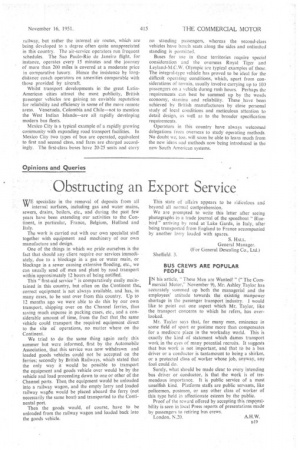Obstructing an Export Service
Page 53

If you've noticed an error in this article please click here to report it so we can fix it.
Opinions and Queries WE specialize in the removal of deposits from all " internal surfaces, including gas and water mains, sewers, drains, boilers, etc., and during the past few years have . been extending our activities to the Continent, in particular, France, Belgium, Holland and Italy.
The work is carried out with our own specialist staff together with equipment and machinery of our own manufacture and design.
One of the things in which we pride ourselves is the fact that should any client require our services immediately, due to a blockage in a gas or water main, or blockage in a sewer causing extensive flooding, etc., we can usually send off men and plant by road transport within approximately 12 hours of being notified.
This "first-aid service" is comparatively easily maintained in this country, but often on the Continent the. correct equipment is not always available, and has, -in many cases, to be sent over from this country. Up to 12 months ago we were able to do this by our own transport, shipping over on the Channel ferries, thus saving much expense in packing cases, etc., and a considerable amount of time, from the fact that the same vehicle could transport the required equipment direct to the site of operations, no matter where on the Continent.
We tried to do the same thing again early this summer but were informed, first by the Automobile Association, that this service was now withdrawn and loaded goods vehicles could not be accepted on the ferries; secondly by British Railways, which stated that the only way it would be possible to transport the equipment and goods vehicle over would be by the vehicle and load proceeding down to one or other of the Channel ports. Then the equipment would be unloaded into a railway wagon, and the empty lorry and, loaded railway wag8n would be placed aboard the ferry (not necessarily the same boat) and transported to the Continental port. Then the goods would, of course, have to be unloaded from the railway wagon and loaded back into the goods vehicle. This state of affairs appears to be ridiculous and beyond all normal comprehension.
We are prompted to write this letter after seeing photographs in a trade journal of the speedboat " Bluebird" arriving by road at lake Garda, in Italy, after being transported from England to France accompanied by another lorry loaded with spares.
S. HALL,
General Manager. (For General Descaling Co., Ltd.) Sheffield. 3.
BUS CREWS ARE POPULAR PEOPLE IN his article, "These Men are Wanted! " (" The Corn
mercial Motor," November 9), Mr; Ashley. Taylor has accurately summed up both the managerial and the employees' attitude towards the existing manpoWer shortage in the passenger transport industry. I would like to point out one aspect Which Mr. Taylor, like the transport concerns to Which he refers, has overlooked.
Mr. Taylor says that, for many men, eminence in some field of sport or pastime more than compensates for a mediocre place in the workaday world. This is exactly the kind of statement which damns transport work, in the eyes of many potential recruits, It suggests that bus work is not important, and that to be a bus driver or a conductor is tantamount to being a shirker, or a protected class of worker whose job, anyway, any fool could do.
Surely, what should be made clear to every intending bus driver or conductor, is that the work is of tremendous importance. It is public service of a most unselfish kind. Platform staffs are public servants, like policemen, postmen, or any other class of worker of this type held in affectionate esteem by the public.
Proof of the reward offered by accepting this responsibility is seen in local Press reports of presentations made by passengers to retiring bus crews.
London, N.20. A.H.W.




































































































